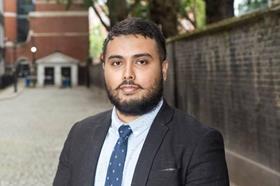As a Muslim solicitor actively serving on the equality, diversity, and inclusion committee of the Law Society, I feel a great responsibility in promoting inclusive policies, rules and procedures within the legal profession to help the progression of other fellow Muslim lawyers.

The Muslim community in the UK has made diverse and significant contributions across various fields.
Muslims have enriched British culture through their influences in art, literature, music, and cuisine. We have made scientific and academic achievements, preserved and translated ancient texts and contributed to medical advancements. Muslims also play a vital role in the UK's economy as entrepreneurs and business professionals.
We actively engage in politics and public service, and our charitable and philanthropic work contributes to social welfare and community development. These contributions have greatly enriched British society and fostered cultural diversity in the country.
Within the legal profession, it is encouraging to observe the growing representation of Muslim solicitors, as evidenced by the latest data from the Solicitors Regulation Authority.
The percentage of Muslim solicitors has increased from 5% in 2019 to 6%, which aligns closely with the proportion of the UK population.
Additionally, it is noteworthy that the current Law Society president Lubna Shuja holds the distinction of being the first Muslim to hold this esteemed position.
Within the ranks of barristers in England and Wales, official records from the Bar Council indicate that approximately 361 barristers have disclosed their Muslim identity, including prominent figures like Sultana Tafadar KC.
Moreover, among CILEX members, 3.5% identify as Muslim. These statistics highlight the growing presence and contributions of Muslim legal professionals within the legal community.
Efforts to foster diversity and inclusivity through initiatives such as the concurrent campaigns run by both the Law Society and Bar Council for the Women in Law Pledge are important. However, it's just as important to address the unique challenges faced by Muslim lawyers that hinder their career progression and opportunities for advancement.
Challenges faced by Muslim lawyers
Religion is one of the protected characteristics listed and defined in the Equality Act 2010. As a British Muslim, I find some solace in knowing that Article 9(1) of the Human Rights Act 1998 affirms my right, and the right of every individual, to manifest our religion or belief through worship, teaching, practice and observance.
It's crucial to note that while legislation acknowledges these rights, it doesn't provide explicit instructions on how employers should or can accommodate religious needs. This is where my concerns begin for my fellow Muslim lawyers.
Many law firms are unaware that certain policies, rules, and procedures can indirectly discriminate against employees who practice their faith.
Throughout my legal career, I have personally faced various challenges, including difficulties in performing my daily prayers obligated upon me called Salah.
In a previous workplace, the absence of a statutory obligation to provide prayer facilities created barriers that made it challenging for me and my fellow Muslim lawyers to fulfil our religious obligations.
Finding suitable spaces for prayer became a struggle, leaving us inconvenienced and isolated in our quest to observe our faith. These challenges not only impacted on our spiritual journey but also had a direct effect on our overall wellbeing and productivity.
It's disheartening when essential aspects of our identity and religious practices are not adequately supported in the workplace.
Muslim Employment Charter
In response to these challenges, the Muslim Employment Charter has emerged as an innovative initiative to foster inclusivity and support the development of Muslim legal professionals.
The charter, founded by Waqas Hussain - an international recruitment entrepreneur turned future trainee solicitor at Bird & Bird - and consisting of fellow lawyers Sana Saddique, Salma Maqsood and Mariam Khan, seeks to overcome these difficulties by establishing an inclusive and supportive environment that addresses the challenges faced by Muslim lawyers.
Central to the charter's approach is a commitment to raising awareness, fostering understanding, and implementing practical strategies within law firms. The approach aims to support and accommodate the needs of Muslim colleagues and create an equitable environment for aspiring legal professionals from diverse backgrounds.
Waqas Hussain said the goal of the Muslim Employment Charter is to 'create a legal profession that truly reflects the diverse society we live in.
'By addressing the unique challenges faced by Muslim lawyers and promoting inclusivity, we can enhance social mobility and ensure equal opportunities for all, irrespective of one's religious background. By championing diversity and fostering understanding, we can forge a legal profession that not only celebrates our differences but also harnesses the strength of a truly inclusive workforce.'
By signing up to the charter, law firms can demonstrate their commitment to diversity, attract and retain top talent, and contribute to a more equitable and representative legal profession.
Law firms can also create a work environment that values and supports the unique needs of Muslim lawyers, paving the way for a more inclusive and thriving legal community.
Creating a faith-friendly workplace requires employers to be aware of the needs of their Muslim employees. Providing prayer facilities and making suitable arrangements, such as clean and quiet spaces dedicated to prayer, can significantly alleviate the struggles faced by individuals. Through personal experience, I have witnessed the positive impact of such accommodation.
Employers who demonstrate an understanding of religious obligations and actively support their employees' faith practices enhance wellbeing and contribute to a more harmonious and inclusive work environment.
As a profession, it is imperative we continue to enhance inclusivity and diversity.
Establishing a healthy, inclusive, and faith-friendly workplace environment requires effective communication.
Law firms and their colleagues should engage in open dialogues about religious differences and beliefs. This approach fosters an accommodating, understanding, and stimulating workplace culture, ultimately boosting morale and productivity.
Shaheen Mamun is a Law Society social mobility ambassador, a member of the equality, diversity and inclusion committee and director of Black Antelope Law






























